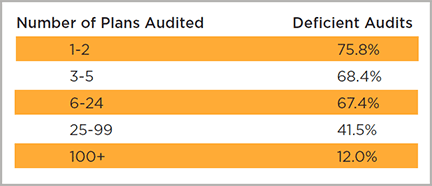When you’re planning an employee benefit plan audit, you need to know that the person or people performing your audit have the skills and experience to do the job correctly. But beyond that, you should work with someone you trust, who will provide ongoing value and advisement even after the audit is over. Once you know what you’re looking for in an auditor, be sure to ask the right questions to ensure they’re a good fit for your organization.
Traits of a quality auditor
Not all auditors are created equal. So then, what does a quality auditor look like? The right professional will be:
- Experienced – Experience is the factor that most influences an audit. Too many companies encounter auditors who don’t fully understand crucial benefit plan provisions, compliance requirements and complexities. The Department of Labor (DOL) has found that auditors who have devoted a significant portion of their time to benefit plans produce better audit results. In their 2015 Audit Quality Study, the DOL observed the following deficiency rates, broken down by the number of plans audited annually by firms:

From Assessing the Quality of Employee Benefit Plan Audits, U.S. Department of Labor, Employee Benefits Security Administration, Office of the Chief Accountant, May 2015.
- Team oriented – The right auditor doesn’t just come in to find the flaws. They will bring in a team of experienced professionals who are regularly involved in benefit plan audits and are connected to the benefit plan community. Audit firms with third-party administration capabilities are available to help you assess the effectiveness of your plan design, discuss retirement plan design strategies, correct identified administrative issues and complete required testing or tax filings. The right team can also provide support during IRS or DOL examination.
- Involved – A plan audit won’t take 12 months, but the right auditor will stay involved year-round. Your plan is complex, and the right advisors will provide ongoing counsel to reduce risk, maintain compliance and offer solutions.
Finding – and hiring – the right auditor for your organization
One of the first steps toward finding a qualified plan auditor is developing and distributing the request for proposal (RFP). This document details your plan and its needs, and is used to obtain in-depth information on potential auditors.
Your RFP should cover:
- A description of the plan
- The scope of the engagement and services desired
- Your goals and requirements
- All related facts that will help you decide
- Contact information, deadline and decision timeline
In addition, there are three considerations to keep in mind when evaluating a potential auditor:
- Skills – Your auditor should have skills that complement your plan administration, including knowledge of your plan(s), as well as experience working with the DOL and IRS. The right auditor will not take a one-size-fits-all approach. They will customize their services to fit your plan and focus on providing value – not just completing the audit.
- Benefits – The right auditor should benefit your business, beyond just the compliance aspect of an audit. Their work can provide you with peace of mind and fraud protection. Skilled auditors can also identify weaknesses in your controls and make sure the plan is cost effective and efficient. Furthermore, the right auditor will make recommendations to improve your benefit plan and safeguard plan assets.
- Fees – Fees are a primary concern for plan sponsors and fiduciaries, but monitoring fees and ensuring reasonable fees are not as simple as choosing the lowest cost provider. Hiring a low-cost provider solely based off of fees could mean hiring someone who is not qualified to audit your plan. This can lead to mistakes, DOL intervention and more costs down the line. The initial expense of hiring the right auditor, while still reasonable, could be higher, but the benefits of a skilled, comprehensive audit, less risk and year-round service should outweigh the costs.
The value of a quality audit goes far beyond compliance. Working with the right auditor can reduce risk and offer plan fiduciaries peace of mind. If you’d like more information on how to identify and select the best auditor for your benefit plan, request a free executive-level fiduciary assessment with a CSH advisor.
